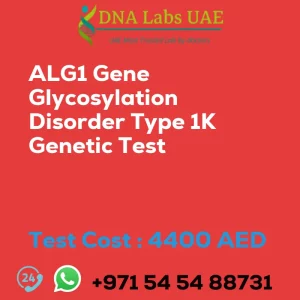HFE Gene Hemochromatosis Classical Genetic Test
At DNA Labs UAE, we offer the HFE Gene Hemochromatosis Classical Genetic Test for individuals who suspect they may have hemochromatosis, a genetic disorder characterized by excessive iron absorption in the body.
Test Details
The HFE gene is associated with hemochromatosis, and our NGS (Next-Generation Sequencing) genetic test analyzes this gene for specific mutations that are known to be associated with the condition.
During the test, DNA is extracted from a patient’s blood sample or other tissue sample. The HFE gene is then amplified using PCR (polymerase chain reaction) techniques. Next, the amplified DNA is sequenced using NGS technology, which allows for the simultaneous analysis of multiple genes or regions of the genome.
The NGS test for hemochromatosis typically looks for two specific mutations in the HFE gene: C282Y and H63D. These mutations are the most common causes of hereditary hemochromatosis, accounting for the majority of cases. If one or both of these mutations are detected, it indicates an increased risk for developing hemochromatosis.
The results of the NGS test can help diagnose hemochromatosis in individuals with symptoms suggestive of the condition, as well as identify carriers of the HFE gene mutations. Early detection and treatment of hemochromatosis can help prevent complications associated with excess iron accumulation in the body, such as liver damage, heart problems, and joint pain.
It’s important to note that while the NGS test for hemochromatosis is highly accurate, it may not detect all possible mutations in the HFE gene or other genes that can cause the condition. Therefore, if a person has a strong family history of hemochromatosis or symptoms suggestive of the condition but the NGS test is negative, further testing may be necessary to confirm or rule out a diagnosis.
Test Components and Price
The HFE Gene Hemochromatosis Classical Genetic Test is priced at 3200.0 AED.
Sample Condition
We accept blood samples, extracted DNA, or one drop of blood on an FTA card for this test.
Report Delivery
The report for the HFE Gene Hemochromatosis Classical Genetic Test will be delivered within 3 to 4 weeks.
Test Type
This test falls under the category of metabolic disorders.
Referring Doctor
A general physician can refer patients for the HFE Gene Hemochromatosis Classical Genetic Test.
Test Department
This test is conducted in our Genetics department.
Pre Test Information
Prior to undergoing the HFE Gene Hemochromatosis Classical NGS Genetic DNA Test, it is important for the patient to provide their clinical history. Additionally, a genetic counseling session may be conducted to draw a pedigree chart of family members affected by Hemochromatosis classical.
For more information or to schedule an appointment, please contact DNA Labs UAE.
| Test Name | HFE Gene Hemochromatosis classical Genetic Test |
|---|---|
| Components | |
| Price | 3200.0 AED |
| Sample Condition | Blood or Extracted DNA or One drop Blood on FTA Card |
| Report Delivery | 3 to 4 Weeks |
| Method | NGS Technology |
| Test type | Metabolic Disorders |
| Doctor | General Physician |
| Test Department: | Genetics |
| Pre Test Information | Clinical History of Patient who is going for HFE Gene Hemochromatosis classical NGS Genetic DNA Test A Genetic Counselling session to draw a pedigree chart of family members affected with Hemochromatosis classical |
| Test Details |
The HFE gene is associated with a condition called hemochromatosis, which is a genetic disorder characterized by excessive iron absorption in the body. The classical NGS (Next-Generation Sequencing) genetic test for hemochromatosis analyzes the HFE gene for specific mutations that are known to be associated with the condition. During the test, DNA is extracted from a patient’s blood sample or other tissue sample, and the HFE gene is amplified using PCR (polymerase chain reaction) techniques. Next, the amplified DNA is sequenced using NGS technology, which allows for the simultaneous analysis of multiple genes or regions of the genome. The NGS test for hemochromatosis typically looks for two specific mutations in the HFE gene: C282Y and H63D. These mutations are the most common causes of hereditary hemochromatosis, accounting for the majority of cases. If one or both of these mutations are detected, it indicates an increased risk for developing hemochromatosis. The results of the NGS test can help diagnose hemochromatosis in individuals with symptoms suggestive of the condition, as well as identify individuals who may be carriers of the HFE gene mutations. Early detection and treatment of hemochromatosis can help prevent complications associated with excess iron accumulation in the body, such as liver damage, heart problems, and joint pain. It’s important to note that while the NGS test for hemochromatosis is highly accurate, it may not detect all possible mutations in the HFE gene or other genes that can cause the condition. Therefore, if a person has a strong family history of hemochromatosis or symptoms suggestive of the condition but the NGS test is negative, further testing may be necessary to confirm or rule out a diagnosis. |








